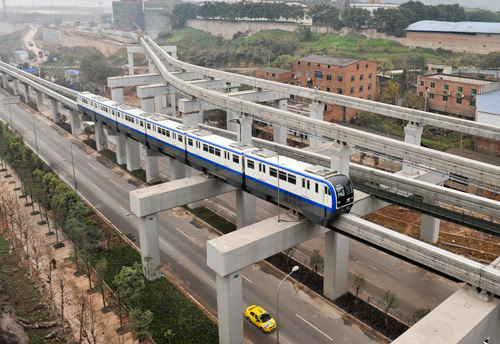|
 |
|
IN OPERATION: A straddle-type monorail vehicle runs down a track in Chongqing on December 28 (LIU CHAN) |
China will maintain a proactive fiscal policy and prudent monetary policy in 2013. That's a conclusion made at the Central Economic Work Conference—an annual meeting held every November or December to set the economic tone for the following year.
This is the fifth year since the 2008 global financial crisis that China has adopted a proactive fiscal policy—or a plan to spend more while cutting taxes. Continuing the proactive fiscal measures will tremendously weaken the policy's impact, causing some concern over the policy's effectiveness in 2013.
Gao Peiyong, Director of the National Academy of Economic Strategy at the Chinese Academy of Social Sciences (CASS), thinks that although the Chinese economy is confronted with difficulties, its growth is on the upswing.
However, since the current fiscal policy has been in effect for several years, its impact is declining, and the policy has even yielded an adverse effect on the country's economic structure and on prices.
This indicates that China does not need a massive stimulus package like the one from 2008. "At present, a structural tax reduction is the best policy that is both conducive to stabilizing growth and avoiding price hikes," Gao said.
A structural tax reduction can boost economic development and promote economic restructuring by raising disposable income and increasing domestic demand.
Li Xuesong, Deputy Director of the Institute of Quantitative and Technical Economics at the CASS, said that although a proactive fiscal policy has been implemented for several years, it still remains appropriate for China's macroeconomic development.
Although China's economy has begun to pick up after seven consecutive quarters of diminishing growth, recovery is not yet stable and continuing a proactive fiscal policy is necessary to stabilize economic growth. But the government must shift its focus from increasing spending to reducing taxes and optimizing expenditure.
Li added that a proactive fiscal policy can also meet the demands of the country's economic and social development. China is aiming to double residents' income by 2020. It must enlarge its middle-income group in a short period to maintain social stability, Li says.
Tax reform
China plans to continue rolling out its tax reform by replacing its current business tax with a value-added tax (VAT) in order to alleviate the tax burden of enterprises. A trial reform began in early 2012 and now extends to 910,000 enterprises in 11 provinces and municipalities, including Shanghai, Beijing and Jiangsu, Anhui, Fujian and Guangdong provinces.
The trial replacing China's business tax with a VAT is set to spread to more regions in 2013. "China has stepped onto a path of massive structural tax reduction," Gao said.
Tax reform will also involve reducing import tariffs on energy and raw materials and implementing a comparatively low tariff rate on imports of advanced technologies, equipment and key components.
As for spending, Minister of Finance Xie Xuren said the country in 2013 would concentrate on expanding domestic demand, promoting employment, maintaining a reasonable amount of investment in infrastructure and implementing favorable policies to encourage private investment.
According to Xie, improving livelihoods will also be the focus of the country's fiscal expenditure in 2013. The Central Government will increase spending in education, health care, social security and affordable housing. Furthermore, spending will increase in agriculture and water conservancy, poverty-stricken and ethnic regions as well as in urbanization.
Regarding lavish government expenses on things like vehicle purchases, overseas trips and official receptions, the Ministry of Finance will strictly control spending.
| 